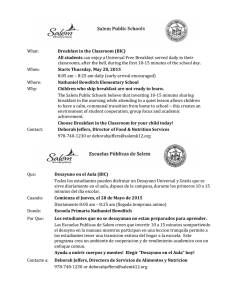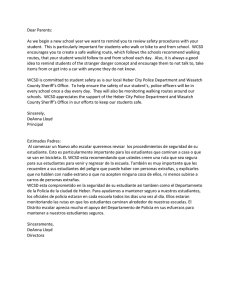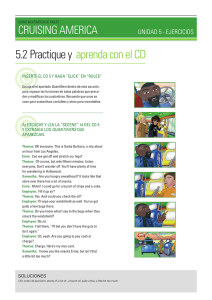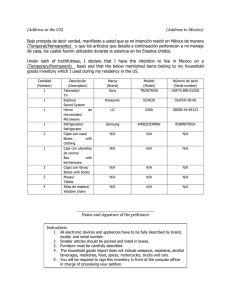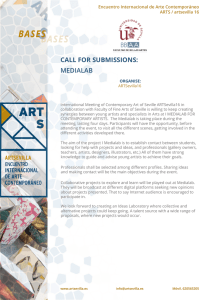Focus on Contemporary Art
Anuncio
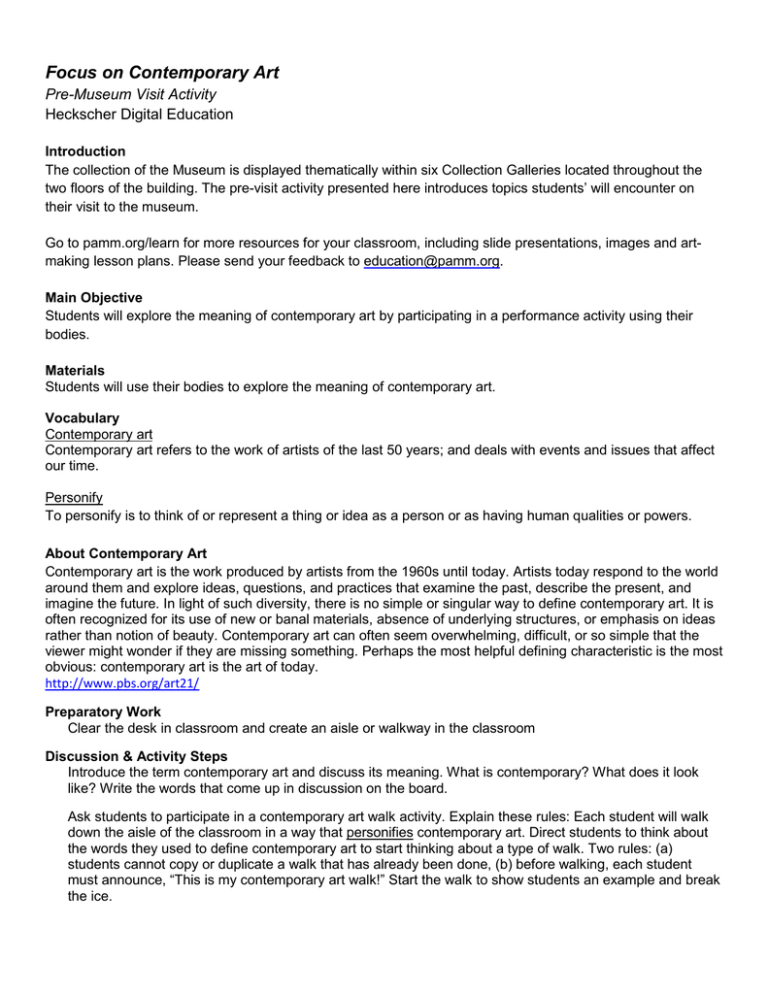
Focus on Contemporary Art Pre-Museum Visit Activity Heckscher Digital Education Introduction The collection of the Museum is displayed thematically within six Collection Galleries located throughout the two floors of the building. The pre-visit activity presented here introduces topics students’ will encounter on their visit to the museum. Go to pamm.org/learn for more resources for your classroom, including slide presentations, images and artmaking lesson plans. Please send your feedback to [email protected]. Main Objective Students will explore the meaning of contemporary art by participating in a performance activity using their bodies. Materials Students will use their bodies to explore the meaning of contemporary art. Vocabulary Contemporary art Contemporary art refers to the work of artists of the last 50 years; and deals with events and issues that affect our time. Personify To personify is to think of or represent a thing or idea as a person or as having human qualities or powers. About Contemporary Art Contemporary art is the work produced by artists from the 1960s until today. Artists today respond to the world around them and explore ideas, questions, and practices that examine the past, describe the present, and imagine the future. In light of such diversity, there is no simple or singular way to define contemporary art. It is often recognized for its use of new or banal materials, absence of underlying structures, or emphasis on ideas rather than notion of beauty. Contemporary art can often seem overwhelming, difficult, or so simple that the viewer might wonder if they are missing something. Perhaps the most helpful defining characteristic is the most obvious: contemporary art is the art of today. http://www.pbs.org/art21/ Preparatory Work Clear the desk in classroom and create an aisle or walkway in the classroom Discussion & Activity Steps Introduce the term contemporary art and discuss its meaning. What is contemporary? What does it look like? Write the words that come up in discussion on the board. Ask students to participate in a contemporary art walk activity. Explain these rules: Each student will walk down the aisle of the classroom in a way that personifies contemporary art. Direct students to think about the words they used to define contemporary art to start thinking about a type of walk. Two rules: (a) students cannot copy or duplicate a walk that has already been done, (b) before walking, each student must announce, “This is my contemporary art walk!” Start the walk to show students an example and break the ice. Optional variations: Students may collaborate and walk down the aisle in pairs. Students may use props from the classroom in their contemporary art walk. Try several rounds of the contemporary art walk using different rules. Ask students to make up a rule for the round. Gather students and discuss which walk they felt best personified contemporary art. What about that walk seemed the most like contemporary art? Remind students that they will visit PAMM on [insert date] and have a chance to talk about and see many works of contemporary art. Assessment Ask students to write a paragraph describing and explaining the walk that seemed to them the most like contemporary art. Enfoque en Arte Contemporáneo Actividad previa a su visita (pre-visita) Heckscher Digital Education Preámbulo La colección del Museo se expone en núcleos temáticos en las Collection Galleries, que se encuentran distribuidas en las dos plantas del edificio. La actividad aquí presentada familiarizara a los estudiantes con temas que serán relevantes cuando visiten el museo. En pamm.org/learn encontrara otros recursos para su aula, incluyendo diapositivas, imagines y currículos con otras actividades de arte. Por favor envié sus sugerencias a: [email protected]. Objetivo Principal Los estudiantes exploraran el significado del arte contemporáneo mediante su participación en una performance utilizando sus cuerpos. . Materiales Los estudiantes utilizaran sus cuerpos. Vocabulario Arte Contemporáneo Arte contemporáneo se refiere a obras de arte producidas en los últimos 50 años, y que tratan con eventos y temas de actualidad. Personificar Atribuir vida o acciones o cualidades propias del ser racional al irracional, o a las cosas inanimadas, incorpóreas o abstractas. Sobre el Arte Contemporáneo El arte contemporáneo está constituido por obras de arte producidas después de 1960. Hoy, los artistas responden al mundo que los rodea. Exploran ideas, preguntas y prácticas que examinan el pasado, describen el presente e imaginan el futuro. Caracterizado por una gran diversidad, no hay manera fácil de definir al arte contemporáneo. En muchas ocasiones es reconocido por su uso de materiales nuevos o banales, por la ausencia de estructuras subyacentes, o por un énfasis en la idea sobre cualquier noción de belleza. El arte contemporáneo puede a veces parecer abrumador, difícil de entender, o tan simple que el espectador se pregunta si hay algo en el que no capta. Tal vez la característica más útil para definir el arte contemporáneo es la más obvia: el arte contemporáneo es el arte del presente, el arte que se produce hoy. http://www.pbs.org/art21/ Preparación para actividad Redistribuya los pupitres en el aula para crear un pasillo amplio. Discusión y guía para actividad Presente el termino Arte Contemporáneo y discuta su significado con los estudiantes. Pregúnteles: ¿Que es el arte contemporáneo? ¿Qué formas toma? ¿Cuáles son sus características? Escriba en la pizarra las palabras que surgen durante la discusión. Invite a los estudiantes a que participen en un “desfile de arte contemporáneo”. Explique las reglas: Cada estudiante debe caminar a lo largo del pasillo personificando al arte contemporáneo. Indíqueles a los estudiantes que utilicen las palabras que surgieron durante la discusión sobre el arte contemporáneo para desarrollar una forma de caminar para el desfile. Dos reglas: 1) los estudiantes no pueden copiar las formas de caminar los unos de los otros. 2) antes de empezar a caminar, cada estudiante debe anunciar “Así camina el arte contemporáneo” Camine usted primero como demonstración. Variantes posibles: 1) Los estudiantes pueden colaborar y caminar en pares. 2) Los estudiantes pueden usar objetos que se encuentran en el aula como parte de su performance. 3) Haga que los estudiantes desfilen varias veces, cambiando las reglas durante el proceso. 4) Propóngale a los estudiantes que inventen reglas nuevas para el desfile. Al final del desfile, agrupe a los estudiantes y discuta con ellos cual creen que fue el modo de caminar que mejor personifico al arte contemporáneo. Recuérdeles que cuando visiten al PAMM verán varias obras de arte contemporáneo. Evaluación Pídales a los estudiantes que escriban un párrafo describiendo y explicando el modo de caminar que les pareció que mejor personificaba al arte contemporáneo.

